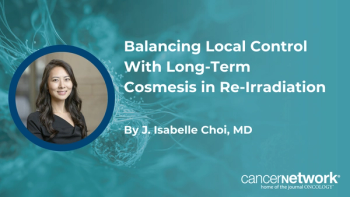
- ONCOLOGY Vol 9 No 4
- Volume 9
- Issue 4
Old Breast Cancer Treatments May Lead to Lung Cancer
If a woman smoked, contracted breast cancer, and was treated with radiation before 1980, her risk of lung cancer has been dramatically increased. Even if she did not smoke, her chances for lung
If a woman smoked, contracted breast cancer, and was treated withradiation before 1980, her risk of lung cancer has been dramaticallyincreased. Even if she did not smoke, her chances for lung cancerrose. These are the findings of a preliminary study conductedat the Columbia University College of Physicians & Surgeonsby Alfred I. Neugut, MD, PhD, an associate professor of clinicalmedicine and public health.
The study compared 89 breast cancer patients diagnosed with lungcancer since 1986 with more than 1,000 breast cancer patientsdiagnosed with nonsmoking, nonradiation related malignancies duringthe same period. Neugut showed that the smokers with breast cancerhad more than 30 times the risk of lung cancer compared with thosewho didn't smoke and had not received radiation.
"This is the first time that a combined risk for lung cancerfrom cigarette smoking and therapeutic radiation has been shown,"Neugut said. "That the excess lung cancer was on the sameside as the breast that was irradiated strongly indicates a causalrelationship and not a statistical fluke."
Now that radiation therapy has improved, delivering narrower,more focused and contoured beams, the associated risks may beconsiderably lower, Neugut notes. In the widely used radiationtechniques following lumpectomy, the beam is directed toward thebreast tissue, away from the chest wall and lung.
Neugut's study confirms his earlier findings which showed a doublingof lung cancer risk following breast cancer radiation therapy.The current study extends these findings to stress the higherrisk of lung cancer for smokers.
Still, he says, the results must be considered preliminary becausethere were some gaps in the data and the numbers were small. "However,the magnitude of the risk and the consistency of the findingsboth within the study and with our prior knowledge of the effectof radiation on the lung support the validity of the findings,"Neugut said.
To verify these results, he is planning a larger scale study.Additionally, Neugut and his colleagues are exploring the combinedeffects of radiation therapy and smoking on patients with Hodgkin'sdisease and lung cancer to see if they find a similar effect.
Articles in this issue
almost 31 years ago
Ganciclovir Implant Prevents Progression of CMV Retinitisalmost 31 years ago
Tomotherapy: Making Radiation Therapy More Precise and Target-Specificalmost 31 years ago
Probable New Herpesvirus Linked to Kaposi's Sarcomaalmost 31 years ago
Trials to Study Race and Prostate Canceralmost 31 years ago
Pre-antibiotic Treatments Spur Modern Fungal Infection Researchalmost 31 years ago
Bacterial Vaginosis Linked to Cervical Intraepithelial Neoplasiaalmost 31 years ago
NCI's Cancer Information Systems-Bringing Medical Knowledge to CliniciansNewsletter
Stay up to date on recent advances in the multidisciplinary approach to cancer.











































